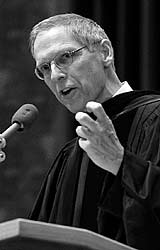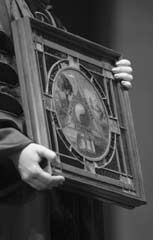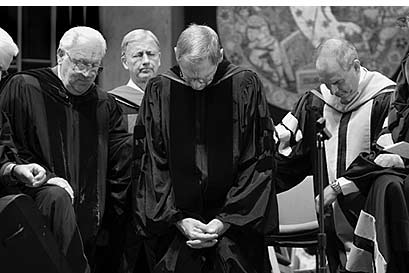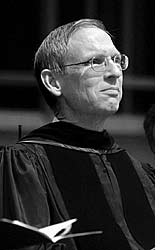


Inaugural Address Transcript
Presented by President Jon L. Dybdahl
Monday, November 18, 2002
In 1912, Walla Walla College President Ernest Kellogg created the official Walla Walla College seal, an emblem to portray the mission of wwc. The seal depicts the three phases of education as parts of an equilateral triangle; the mental, represented by a lamp; the physical, depicted by a plow denoting the importance of manual labor; and the spiritual, pictured by an open Bible.
As a symbol of wwc’s commitment to its mission, a stained glass window of the seal was presented to Jon L. Dybdahl during the presidential inauguration ceremony.
The stained glass window is a historical piece that graced the main entrance to the Administration Building for many years. Its presence above the building’s front door reminded all who passed through of the values of wwc’s mission.
Now displayed in the president’s office, it serves as a reminder to President Dybdahl and all future presidents of wwc’s mission and the challenges, rewards, and responsibilities of being entrusted with this mission.
 Distinguished
guests, honored alumni and generous contributors, esteemed board of trustees,
nurturing family, admired faculty and staff colleagues, and—most of all—beloved
students: thank you for coming to this celebration of Walla Walla College
and its mission.
Distinguished
guests, honored alumni and generous contributors, esteemed board of trustees,
nurturing family, admired faculty and staff colleagues, and—most of all—beloved
students: thank you for coming to this celebration of Walla Walla College
and its mission.
Like many new college presidents, I was very reluctant to have this much fuss made over an inauguration. I wondered if it was worth the work, and the cost, and the time.
One argument changed my mind. This inauguration is for the college—110-year-old Walla Walla College—our college, which is bigger by far than any of its presidents or faculty or board members. This is what we celebrate today. This institution, this learning committee, founded on a vision and focused on a mission. It was here before any of us were born, and if time lasts, will be here long after we’re gone. Let us with joy today celebrate together the mission, the meaning, and the mystery of Walla Walla College.
When our forefathers and mothers founded this college, the Adventist church in the Northwest had 1,500 members. If you are religious, you call that faith. Faith or not, it is certainly courageous. Theologically, it is astounding. Our pioneers believed that Jesus, who had lived in this world, was going to keep his promise and literally come back again.
I thank God for not only our leaders of the past, but the unsung people who gave time and money, who worked and studied, and sent their physical and spiritual children to this college because they believed in this vision and because their lives were focused on its mission.
Our four living, former presidents are a recent part of that great heritage. All of them are here today. They have already had a part in this ceremony, and I want to say thank you to them. Their effective leadership is testified to by the fact that this college is healthy today. Thank you for being here to celebrate.
Just last month we laid to rest “Prof” Ed Cross. Prof and his wife founded our engineering school and literally built it from the ground up. They came here, sight unseen, to launch a vision. Not only does their legacy live on in the buildings, and in the engineering program, and in the lives of students, they almost unbelievably, considering the salary that they got at the college, gave a large financial gift to continue the work here. Their spirit lives on.
And I mention Mae Mehling, whom we also recently lost. She represents
a host of people who faithfully and quietly, behind the scenes, care for the
needs of people. When her professor-husband lived, she supported him; with
him gone she continued to feed, house, and serve the college, the church,
and the community, untiringly. These two legends
represent much of the best of our heritage.
I mention two living legends who are with us today. Walt Meske, Walla Walla College graduate, long-time men’s dean, vice-president for student administration. When students shook hands with Walt Meske, the grip let them know who was in charge. But the smile and the twinkle in his eye let them know they were cared about. “Retired,” Walt continues to be a strong advocate of the college and to care for people as a chaplain at the General Hospital.
 Helen
Zolber served for years as women’s dean, and then chaired the English
Department. Her influence is legendary. She has returned here in “retirement,”
but has been long-time chair of our Committee of 100 and served as president
of the Alumni Association. She continues to give to the college in many ways.
Helen
Zolber served for years as women’s dean, and then chaired the English
Department. Her influence is legendary. She has returned here in “retirement,”
but has been long-time chair of our Committee of 100 and served as president
of the Alumni Association. She continues to give to the college in many ways.
I salute these people, who represent the heritage of this college. The lives and principles of our pioneers and living legends must be remembered and taken seriously. They not only inspire us, but they help to guide us, as we face a challenging future.
In a faith community like ours, there’s always a danger. Some see only the glory of the past and the threat of the future. They want, with both hands, to hold on to the safe past and bring us back to earlier times. To such we must gently but firmly say, “We hold to the clear principles and mission of the past but we have always believed in present truth.” Our pioneers themselves reached out to the future, believing that God’s hand, which had led them in the past, would lead them as they faced the future. Bold plans, rooted in past truth, are not a denial of our heritage, but an affirmation of its validity.
On the other hand, others, perhaps disgusted or bored with their past story, with both hands eagerly grasp the future. To such, clear warning must be given. To disdain or fail to learn from our past is to live dangerously. Biologically, socially, religiously, and in every other way, our roots should and do affect us. Our vision must understand the past, and anticipate the future, and unite the best of both in a vibrant present.
Today we are not perfect, but we are strong. We have a pervading sense of loyalty to the college. I was pleased when I visited here last spring to find, even among students, a feeling that there’s no place quite like Walla Walla College. I can tell you that those kinds of convictions are priceless. They can not be bought with money.
For a long time we’ve cared about the quality and excellence of our academics, and it’s satisfying to see them recognized by the U.S.News & World Report rankings which put us in the top 25 percent of regional master’s colleges and universities.
We have a hard-working, creative faculty who care about teaching and scholarship. We have a competent staff. We have a congenial and efficient administration. A family atmosphere and friendship prevail here, as our recent accreditation visitors testified. Faculty, staff, and students do have an understanding of and a commitment to the college’s mission. We are not rich, but we are solvent, and barring tragedy, we will have a small budget surplus this year. We are pleased about all of this.
In initial thoughts about an agenda for the next few years of the college, I mentioned to the faculty, to the staff, and to the board, five things that I think are important for us to emphasize. These are based on earlier work the college and its board have done, on conversations with people, on my sense of the needs, and on the accreditation evaluation, which we received recently.
Number one: A clear articulation of our mission and vision. Nothing can happen if we do not continue to see clearly what our mission is and articulate that clearly to people.
Number two: We need an integrated, workable, strategic plan
that addresses financial issues, faculty and staff remuneration, and student
needs, in a holistic context. 
We want to build human relationships in all areas, between the
different constituencies, within the college, and outside the college as well.
We want to think mission. This college, as has been mentioned, sends large
numbers of student missionaries, people to serve and work cross-culturally.
We would like to see that grow even more, and as we extend our international
outreach to reach to diverse groups, we also at the same time want to encourage
greater diversity among our students, faculty, and staff here on campus.
We want to continue our capital campaign. We need to not only take down the administration building, we need to see the administration building go up as well. We want to build, to furnish the needs that are on campus, and so we need to complete that.
These are but the beginning steps in meeting present needs, but the mission is broader than this, and the vision is deeper than this. I would like Walla Walla College to be a powerful, positive, life-changing experience for all who work and study here. And we believe that our heritage fits us to do that.
We believe that in many ways it’s already happening, but we want to grow so our college can become a model and beacon of light to the world. This means that education found here must not only address the mind, but affect the soul and heart as well. Academic excellence must be blended with spiritual commitment, moral integrity, and aesthetic appreciation, a holistic development. Intellect and religious faith should not be in separate compartments, isolated to certain times and places, but faith should impact all academic disciplines, and intellect affect all areas of faith.
At such a place, with such a vision, we could affect our world and our church. Many times in history, colleges and universities have been a source of renewal for the church and for the world. We want to do that at our college.
If we do, Walla Walla College would not only be a life-changing experience for those on this campus, but it would impact our world and our church, far beyond its borders. This is my dream.
Yes, I do believe the words, familiar to many of us, from the pen of Ellen White, one widely revered in our church as a prophetic voice, “We have nothing to fear for the future, except as we shall forget the way that the Lord has led us and his teachings in our past history.”
Our present is alive and exciting, as we move forward in this dialog of past and future. I see with one eye and hear with one ear and hold with one hand, my paternal grandmother. She represents my heritage. As a young, single girl, she left home in Wisconsin to become the first Seventh-day Adventist church school teacher in Canada. That was not adventuresome enough. She became a single missionary to Tahiti, learning French in the process. She came home on furlough and met widowed Lars Dybdahl, and decided that perhaps she would adopt her toughest mission of all, to marry him and raise his six motherless children, ages four through 14, one of them being my father. In the face of limited finances, she made sure that all of them had an opportunity to attend college.
 With
my other hand and eye and ear, I grasp and see and listen to our eight grandchildren,
represented by the oldest, Alexandra. Not a day goes by, but I think of what
kind of world, what kind of church, what kind of college, will we leave to
Alex and her sisters and cousins and their friends.
With
my other hand and eye and ear, I grasp and see and listen to our eight grandchildren,
represented by the oldest, Alexandra. Not a day goes by, but I think of what
kind of world, what kind of church, what kind of college, will we leave to
Alex and her sisters and cousins and their friends.
Is there a way that what grandma Anna and granddaughter Alex embody, can meet, and talk, and play, and worship, and study together in love? That’s our call.
I hear the voices of people representative again of what this place means. Voices of Paul Heubach, Loren Dickinson, Don and Donnie Rigby, J. Paul Grove, and our illustrious present-day faculty and staff. At the same time I see the face, I hear the voice, I grasp the hand of the future in students, represented by student association leaders like Bobby Sandborn, Ross Brown, Ryan Lunsford, Caleb Foss, Jessica Craik.
In the face of temptation to hear only one side and one voice, we must continue the challenging task of listening to and holding on to the past and the future, personally and as a college community. As we do this successfully, under God, we will succeed in accomplishing our mission.
We will create communion between our heritage and the future, and that common effort will forge us into a powerful life-changing experience of community here and now. After all, our statement of mission begins with a vision that calls this college a community of faith and discovery, and we celebrated that in our litany. These should not just be high-sounding words.
Best-selling author M. Scott Peck, in the preface of his book The Different Drum says it bluntly and plainly, “In and through community, lies the salvation of the world.”
If, by the grace of God, Walla Walla College can be that kind of community and even grow in that togetherness, it can model and mediate community to a world that desperately needs that kind of caring.
I’m thankful today for my country, where we can freely speak our minds without fear, and be joined in the celebration of who we are by those who at the highest level represent our great state.
I am thankful for my church, which has lovingly taught me and its community and facilitated mission. I praise God for his grace and his healing in my own life.
I am thankful for my family who make my presence here possible. I am grateful for my father who is here, my much-loved wife, Kathy, my extraordinary children and their spouses, who are also our children, and grandchildren, and other members of the extended family.
But really, today is Walla Walla College’s special day.
I am especially thankful for this college. This college has in a real sense
helped make me who I am. I owe much to her. She has treated me graciously.
I
believe in her mission, and I pledge today, to the best of my ability, to
serve her faithfully. Hopefully to give as much back to her as I can.
I have already, in my short tenure here, made it my business to ask people to pray for the college. I do the same today. Pray that this special place, this unique community, may fulfill its divine mission and be all we dream it could be, so that in the end, glory can be given to God, from whom all blessings flow. W